
 |
|
|
|
|
#1 |
|
Member
Join Date: May 2007
Posts: 199
|
dear Rick, Alan and Kerislovers,
One type of creations by Empu that receiving less enthusiasm is TOMBAK (spearhead/lancepoint [?]). I would like to invite all of you to discuss about and to share images of Tombak you have. Who knows, even you just love Keris, the discussion of Tombak could broder us the understanding of our interest. Lets begin... warm salam, Usmen |
|
|

|
|
|
#2 |
|
Member
Join Date: May 2007
Posts: 199
|
.
|
|
|

|
|
|
#3 |
|
Member
Join Date: Mar 2006
Location: Room 101, Glos. UK
Posts: 4,184
|
mine:
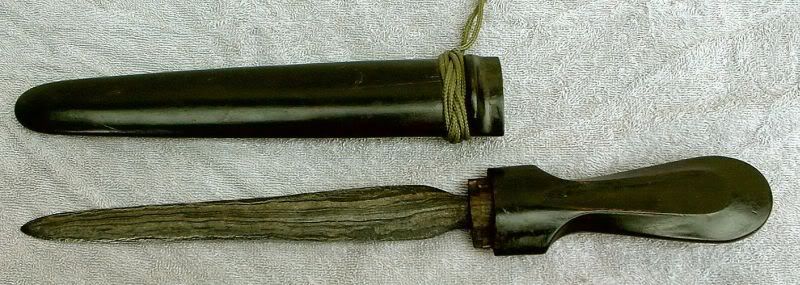
|
|
|

|
|
|
#4 |
|
Member
Join Date: Sep 2005
Location: The Netherlands
Posts: 69
|
The Tombak you presented has a nice shiny pamor.
Can you (or anybody else) tell more about this pamor (material) Is this one made with nikkel? and the estimated age of this tombak? It seems to have reflection pamor as well if i am not wrong. gr martin |
|
|

|
|
|
#5 |
|
Member
Join Date: May 2006
Posts: 6,893
|
Pak Usmen, is it possible for you to provide a photo of the metuk at 90 degrees?
This is pretty important, because with tombak the metuk is one of the prime indicators. Is this pamor nginden? If so, could you provide a photo looking down the length of the blade towards the point, so that we can see the nginden pattern? Thanks. |
|
|

|
|
|
#6 |
|
Member
Join Date: May 2007
Posts: 199
|
Pak Alan and kerislovers,
I am afraid that I cannot provide images of methuk at 90 degrees and the length of the blade toward the point at this moment. I dont bring that tombak here. It is on the top of 3.25m landeyan walikukun (spear made from walikukun wood/tree) in my home in Jogja now. I will check whether there is other tombaks which are now here in Africa having the same type of methuk as I uploaded above. Why do you think methuk is important for tombak, Pak Alan? as I saw, there were 2 types of methuk: iras ( unseparately with blade?/english please  ) and ordinary (separately with blade). Sometimes the ordinary methuk was changed. So the kind of steel of blade was different from the kind of steel of methuk. Please try to watch carefuly the tiny image of tombak Kanjeng Kiai Ageng Plered in Yogyakarta Heritage book (page so and so, when it was cleaned personally by the Sultan HBX). I just had a curiosity that its methuk steel was different from its blade steel. So, please give enlightment of the importance of methuk based on your views. I got the story of the important of methuk/gonjo but from the spirit point of view. not quite important to be shared in this thread. ) and ordinary (separately with blade). Sometimes the ordinary methuk was changed. So the kind of steel of blade was different from the kind of steel of methuk. Please try to watch carefuly the tiny image of tombak Kanjeng Kiai Ageng Plered in Yogyakarta Heritage book (page so and so, when it was cleaned personally by the Sultan HBX). I just had a curiosity that its methuk steel was different from its blade steel. So, please give enlightment of the importance of methuk based on your views. I got the story of the important of methuk/gonjo but from the spirit point of view. not quite important to be shared in this thread. I feel there is chatoyant "gedhagan" in that pamor. Pak Alan, what kind of pamor motive do you think? Does anyone know the grand pusakas' names (especially tombaks) of 4 castles in Jawa: Kasultanan, Kasunanan, Pakualaman and Mangkunegaran? warm salam, Usmen |
|
|

|
|
|
#7 | |
|
Member
Join Date: May 2007
Location: J a k a r t a
Posts: 991
|
Quote:
I like the pamor of your tombak. Yes, it is the genre of "beras wutah" or "wos wutah" (spilt rice?). But, more specific it is "ilining warih" (the flow of water). Our life is flowing everyday, like the flowing of water in the river... Ganjawulung |
|
|
|

|
|
|
#8 |
|
Member
Join Date: Mar 2007
Posts: 49
|
i think i'm falling in love with your tombak Mr.Usmen..
 i agree with Mr. Gonjo the pamor is "wos wutah", Dear Mr.Gonjo that is HB or PB??  GR cahaya |
|
|

|
|
|
#9 |
|
Member
Join Date: Sep 2005
Location: The Netherlands
Posts: 69
|
I think wos wutah should be more right.
With ililing warih pamor the inner part consist of wavy / flowing lines too, instead of circles. Outside the middle you see indeed some wavy lines. This is mostly inherent with the wos wutah, and can differ with the fact for example how many(and thick) pamor "sheets" are used combined with iron , and the thickness of the iron sheets. |
|
|

|
|
|
#10 |
|
Member
Join Date: May 2006
Posts: 6,893
|
Pak Usmen,
I was taught that one of, if not the, prime indicator for tombak is the metuk. There is considerable variation between metuk of different tangguh. Tombak are much more difficult to classify according to tangguh than are keris. With a keris, especially if you have a rondha, classification of a quality blade is really pretty easy, yes, it can become something to dispute if the blade is less than very good quality, but tangguh was never intended to be applied to substandard blades in any case. However, with a tombak, what you have is pawakan, material, metuk.Time can alter pawakan, material is often difficult to read, most especially from a photo, when it becomes virtually unreadable, what you are left with is the metuk.So, just as when we look at a keris, we home in on one feature first, rondha if its there, or maybe the blumbangan, or maybe the material, and then we ask what classification it can be if it possesses this feature, for instance, if that blumbangan is boto adeg, we know immediately that we are not looking at Mataram, bold heavy blade?---we know its not Maja---so what are we left with?We then attempt to confirm this with the other features. Same thing with a tombak, the first thing I was taught to look at was the metuk, then I look at other features to try to confirm what it should be, based on that metuk.If the other featrures fail to confirm, then I've got problems. To adequately assess the metuk you need to see it at a dead straight 90 degree angle, if you don't see it like this the shape and proportion can be inaccurate and you can be misled. If a metuk has been changed, it might be a case of a new metuk being made for the blade, in which case you can expect the metuk to reflect the style of the time and place where it was made, or it might be a metuk from another tombak put on the one you're looking at. In the case of a metuk from a different tombak, its not that difficult to pick, usually---you look at the fit and alignment, same as you would with a changed over gonjo, with a new one made for the blade you need to rely on an assessment of material, and if this was done a long time ago you're probably just going to be guessing. But in any case, as I have already said:- tangguh was never intended for substandard pusakas, so it doesn't matter too much anyway if you cannot give a supportable tangguh with something that is substandard. In respect of the tombak under discussion. This is a very nice tombak by any measure. To my eye, from the photo, it looks like 19th century Surakarta work, but I would not be definite about this without handling it.In all honesty, I am hesitant to even give this tentative classification:- tangguh is just too, too, difficult, if not impossible, from photos. You need to handle the things. Tangguh is not just matching the way something looks to a mental template, you need to be able to feel it as well. As far as pamor goes, I feel that the people with whom I associate would simply call this "wos wutah", and then comment upon and discuss the way in which it had been made, rather than try to give a sub-classification of wos wutah, which can become contentious.I don't think we can call it ilining warih. I understand ilining warih to be a sub-classification of adeg, and adeg is pamor miring, this is clearly pamor mlumah.It does look as if it is a pamor nginden, but unless it is possible to tilt the blade to read the nginden pattern, it is impossible to comment further. |
|
|

|
|
|
#11 |
|
Member
Join Date: May 2007
Posts: 199
|
Pak Alan,
Thank you for elaborating the importance of methuk. I would like to learn about it. Hope we, all kerislovers, can share the knowledge in this field area by contributing images and comments. I bring here (in Africa) some tombaks and I will take pictuces one of them, especially its methuk, from several angels as proposed by Pak Alan. Hope other kerislovers can contribute if any. warm salam, Usmen PS: I will upload in the earliest time possible after taking pictures |
|
|

|
|
|
#12 |
|
Member
Join Date: May 2007
Posts: 199
|
dear Pak Alan, Pak Ganja, Pak Cahaya, Pak Simatua, Pak Kronckew,
and Kerislovers, Now I am uploading other images of tombak Kiai Kalacakra, especially its methuk. Hope these images can be source to discuss deeper about the importance of methuk of tombak. Now, may I give the floor to all of you. warm regards, Usman ps. this week is so quite, are you all fasting   
|
|
|

|
|
|
#13 | |
|
Member
Join Date: May 2007
Posts: 199
|
Quote:
Longtime not to hear you, where have you been? journey to other continent   I also hear that some "wos wutah/split rices" pamors are classified as "ilining warih/flowing water" or/and "wahyu tumurun/[english?]". As Pak Alan said, in conservative ways, it is called simply "wos wutah". When we try to make more specific name either flowing water pamor, wahyu tumurun pamor, jung isi donyo pamor or (especially) rojo gundolo pamor, the space of discussion will be opened. Pak Ganja, I am waiting for you to upload Tombaks images  warm salam, Usmen PS: do someone know dapur laler mengeng? what did people believe with this kind of keris (e.g. it was believed that golden rain pamor would make the owner could enjoy prosperity). |
|
|
|

|
|
|
#14 |
|
Vikingsword Staff
Join Date: Nov 2004
Posts: 6,293
|
An old one ?
 Thoughts, comments ? 
|
|
|

|
|
|
#15 |
|
Member
Join Date: May 2006
Posts: 6,893
|
Pak Usmen, I have not encountered any esoteric beliefs attached to dhapur laler mengeng.
I've just had a look at several books where I would expect to find mention of this if there was some belief attached to laler mengeng, and there is no mention of such a belief. Apart from this, there seems to be a little confusion about exactly what the characteristics of laler mengeng are. I've always known it as a straight keris with an inwards turning kembang kacang, as shown in Ensiklopedi, but some people seem to believe it is a straight keris with the kembang kacang in correct orientation, but constrained within the bounds of the gandhik. This is not at all unusual in discussion of dhapur; it can be a source for considerable disagreement between equally knowledgeable people.In fact, in my experience, almost everything to do with keris can generate unending discussion, especially if we have two---or more--- knowledgeable people, both of whom are convinced they are right--- when maybe there is no "right", and no "wrong", just different opinions. Rick, to me, this looks like a Mataram tombak where the metuk has lost form; the base of a Mataram metuk spreads more widely than the metuk in this tombak. This metuk is more like Tuban, but the blade body is totally unlike Tuban. To give a reasonably supportable opinion it would really be necessary to handle this tombak. |
|
|

|
|
|
#16 |
|
Member
Join Date: May 2006
Posts: 6,893
|
Two tombak.
The black one is a Mangkunegaraan Palace tombak, stamped on one face "99" & "1862", stamped on the other face "M" & "4". The brass brongsong on the landean is stamped "86" & "1862" A Surakarta classification tombak with metuk kinatah. |
|
|

|
|
|
#17 | |
|
Member
Join Date: May 2007
Location: J a k a r t a
Posts: 991
|
Quote:
I have similar tombaks as yours, although they maybe come from different tangguh. I hope, they are from Mataram era... With thirteen luks, so we call them (yours too) as tombak with dapur korowelang... Ganjawulung |
|
|
|

|
|
|
#18 |
|
Member
Join Date: May 2007
Location: J a k a r t a
Posts: 991
|
This is another type of korowelang tombak, slimmer with 13 luks too. Hopefully from Mataram era...
Ganjawulung |
|
|

|
|
|
#19 | |
|
Member
Join Date: May 2007
Posts: 199
|
Quote:
Hallo Gonjo welcome back to the waroeng I wonder why there are a lot of dapur korowelangs expected tangguh Mataram Sultanangungan (Sultan Agung Era). I have found them several times. Even I have one tombak similiar as yours. According to Stephen's Tombak, I agree with you that it is one type of barukuping. If Stephen hangs two small bells on the holes, it will be called baruklinthing [?](klinthing=small bell)  . One of the legendary tombak in Jawa is Kiai Baruklinthing. Any kerislovers know where Kiai Baruklinthing is now? . One of the legendary tombak in Jawa is Kiai Baruklinthing. Any kerislovers know where Kiai Baruklinthing is now?Kiai Baruklinthing was the grand pusaka of Ki Ageng Mangir (descent of Ki Ageng Giring). Babad Ki Ageng Mangir is just like a shakespeare/hamlet from England. It is believed that he is the ancestor of people who use Kolopaking as their family name. However, Kolopaking name was known long after Ki Ageng Mangir era (Kolopaking v. Arumbinang (his)-Strory). Warm salam, Usmen |
|
|
|

|
|
|
#20 | |
|
Member
Join Date: May 2007
Location: J a k a r t a
Posts: 991
|
Quote:
I am still in Changi Singapore, on the way back to Jakarta from Paris. I will join with you all, tomorrow... Ganjawulung |
|
|
|

|
|
|
#21 |
|
Member
Join Date: Dec 2004
Location: Inland Empire, Southern California USA
Posts: 160
|
My Tombaks. I tryed to show the dress of the small one that exhibits chatoyantcy; possessing a changeable luster, like that of a cat's eye, Enjoy.
Stephen 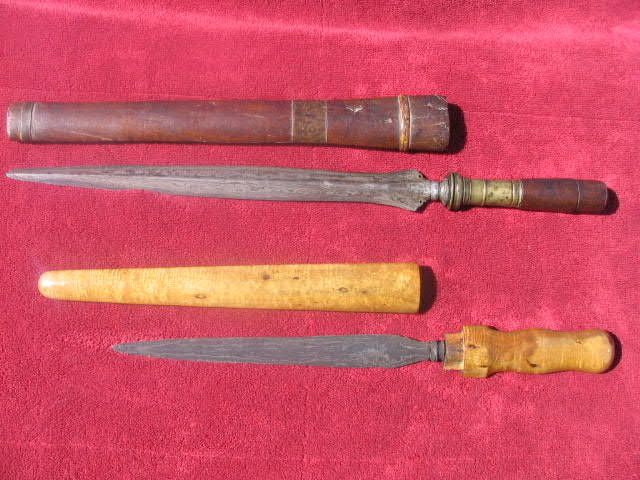 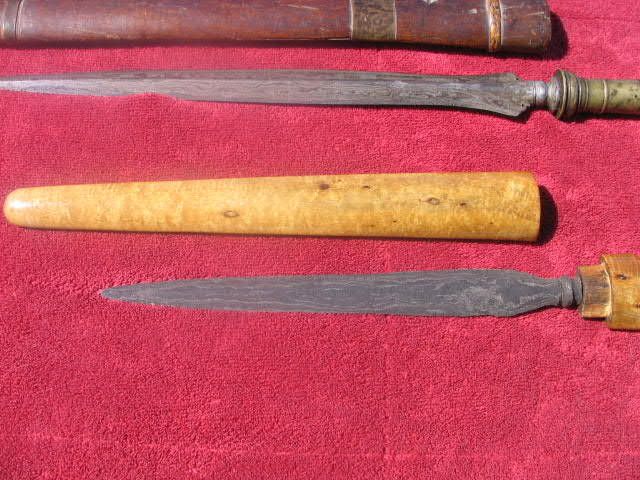 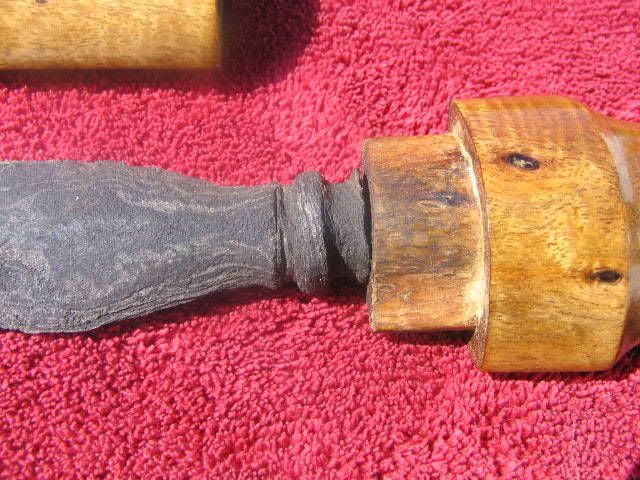 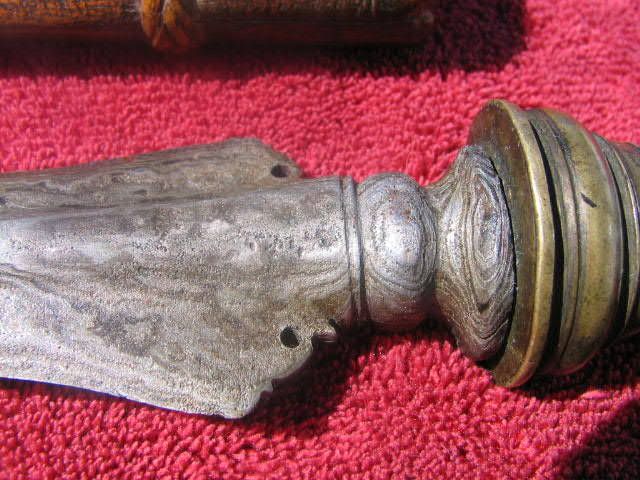 
|
|
|

|
|
|
#22 |
|
Member
Join Date: Jul 2007
Posts: 7
|
Morning everyone !!!!!!
Does this consider a tombak or an arrow head ??? Cause it's only 9cm not including the pesi. 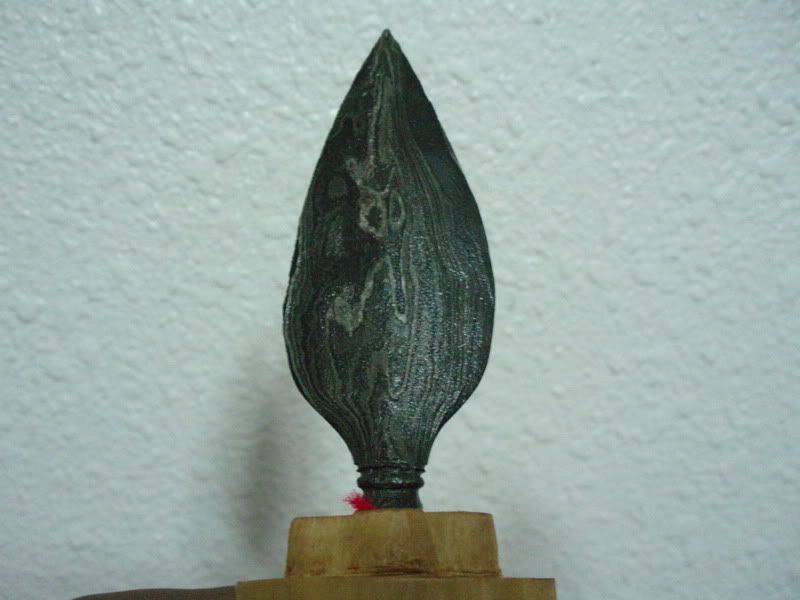 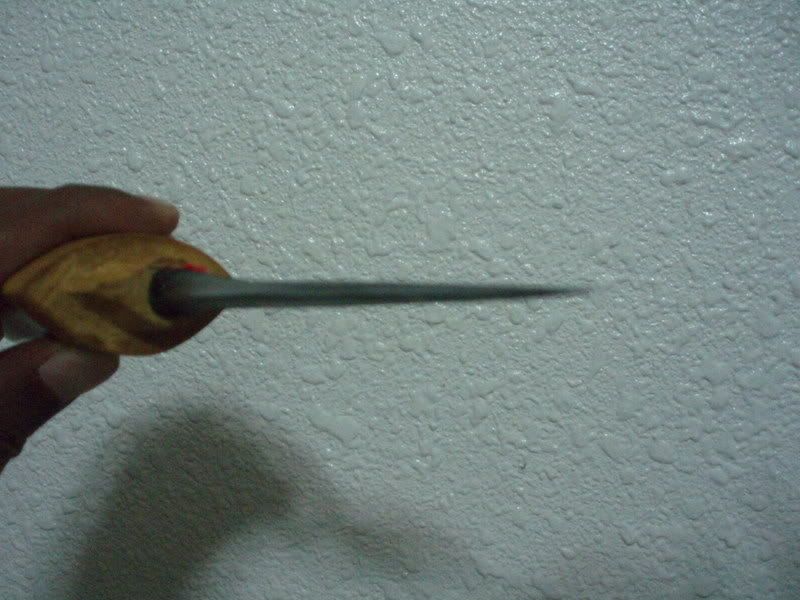 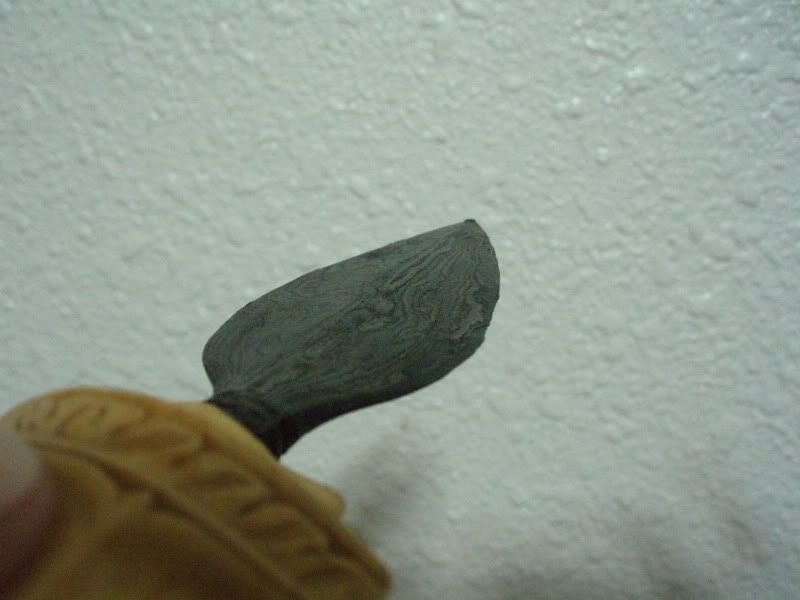
|
|
|

|
|
|
#23 | |
|
Member
Join Date: May 2007
Location: J a k a r t a
Posts: 991
|
Quote:
Your tombak in the center, is really a nice looking tombak. We call it, tombak with dapur "baru kuping", with kind of two holes near the base of the tombak. Like holes for earrings. "Kuping" in javanese language means "ear". And "baru" could mean "new", but for the tombak term, it is a name of straight tombak dapur... The "sarung" (tombak sheath) with such model, Madurese people call it as "seken". Madurese people use to bring the seken with tombak behind their clothes. Hidden... (This picture below, I show you the "seken" model, with tombak made in 20th century, with "silver-nickel" pamor of "teja kinurung" (surrounded light?). It has "methuk susun" or piled methuk...) Ganjawulung |
|
|
|

|
 |
|
|